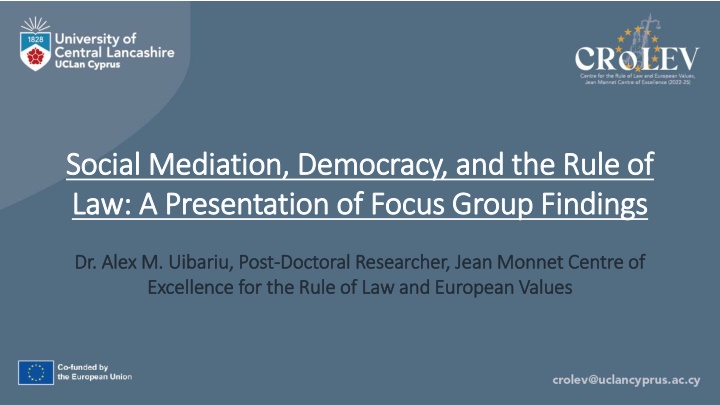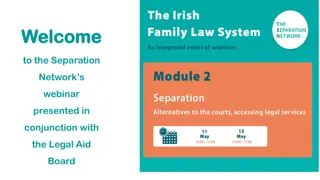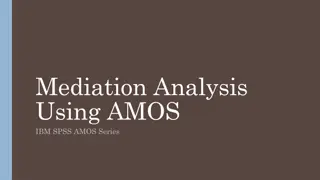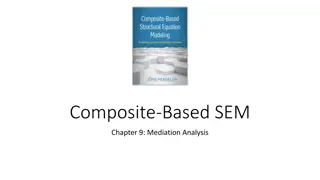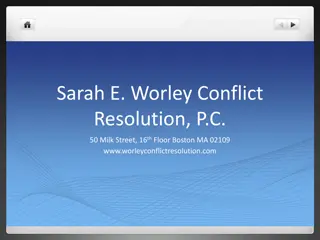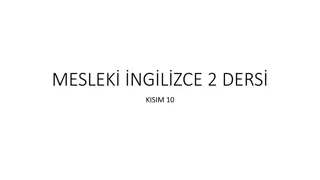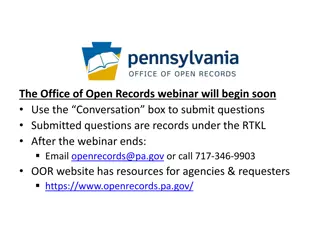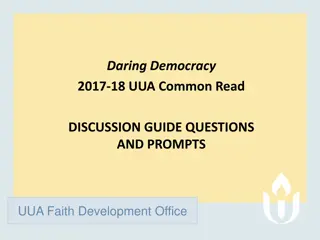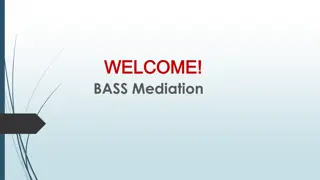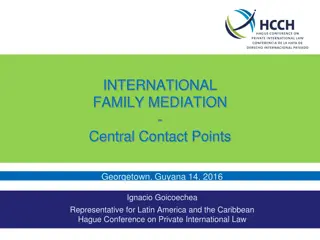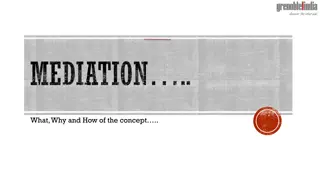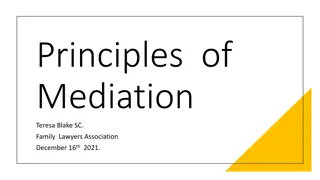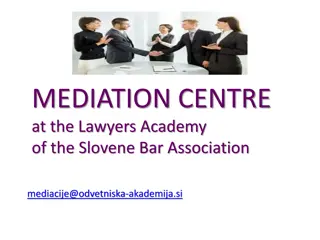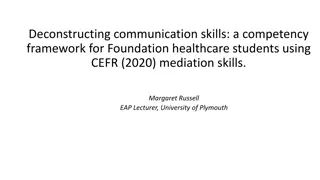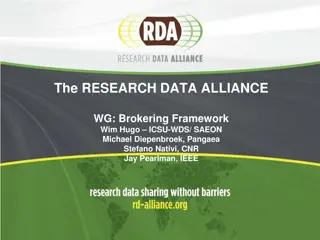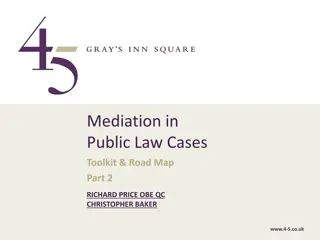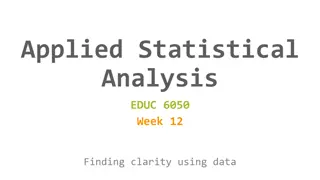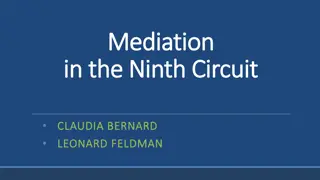Social Mediation, Democracy, and the Rule of Law: Focus Group Findings
Dr. Alex M. Uibariu presents findings on social mediation, democracy, and the rule of law from a focus group study. The research explores the interconnectedness between democratic values, governance, and civic engagement. Discover how civic engagement can contribute to upholding the rule of law through consultations, awareness initiatives, and dialogue forums.
Download Presentation

Please find below an Image/Link to download the presentation.
The content on the website is provided AS IS for your information and personal use only. It may not be sold, licensed, or shared on other websites without obtaining consent from the author.If you encounter any issues during the download, it is possible that the publisher has removed the file from their server.
You are allowed to download the files provided on this website for personal or commercial use, subject to the condition that they are used lawfully. All files are the property of their respective owners.
The content on the website is provided AS IS for your information and personal use only. It may not be sold, licensed, or shared on other websites without obtaining consent from the author.
E N D
Presentation Transcript
Social Mediation, Democracy, and the Rule of Social Mediation, Democracy, and the Rule of Law: A Presentation of Focus Group Findings Law: A Presentation of Focus Group Findings Dr Dr. Alex . Alex M. Uibariu, Post M. Uibariu, Post- -Doctoral Researcher, Jean Monnet Centre of Doctoral Researcher, Jean Monnet Centre of Excellence for the Rule of Law and European Values Excellence for the Rule of Law and European Values
Background Background Citizen Empowerment: Sustainable Rule of Law and European Values in Europe training, held December 2nd-3rd 2022; Collaboratively organised by the School of Law, UCLan Cyprus, and the Interdisciplinary Centre for Law, Alternative and Innovative Methods under the Jean Monnet Centre of Excellence for the Rule of Law and European Values; Open to the public, free of charge; Attendance possible in person or virtually.
Methodology Methodology Grasp the interconnectedness between democratic values, democratic governance, and civic engagement on the one hand, and the rule of law on the other, as expressed by professionals; Highlight the ways in which civic engagement can actively contribute to upholding the rule of law. 76 applications for attendance: 46 advocates; Students, university graduates; Educators and researchers; Law enforcement officers. Data Collection Ethical Issues Data collected during the training session entitled Citizen empowerment: Sustainable Rule of Law and European Values in Europe ; Hybrid format; Three moderators; Audio recorded; informed consent; anonymity; confidentiality; data management and protection; Aim Participant Pool
Data Processing and Analysis Data Processing and Analysis Familiarisation with the data (via transcription and re- reading) Initial coding Review of coding Identification of themes Review of themes Integration of data into categories Reporting
Theme 1: Uses of Social Mediation Theme 1: Uses of Social Mediation SM cannot substitute formal processes . However, its positive effects as an educational exercise in democratic practice were praised: Increasing the Sustainability of the Rule of Law SM can achieve sustainable rule of law through public and institutional consultations, awareness initiatives and training, channels for monitoring and reporting, dialogue forums, as well as rehabilitative processes complementing criminal and other legal procedures. Consultations: SM can be effectively used for the purposes of engaging the wider public in decision-making, particularly in societies where long-standing divisions are present. Draft Proposals: SM should result in the formulation of some draft proposals for various stakeholders in the forms of formal and informal rules to be adopted by the state institutions for effective changes for the larger community [and] implementing more public participatory norms. Pressuring the Legislature to Act: formal legislation is always [characterised] by a time lag between the action [or incident] and the formal process . Using SM can serve two purposes; [firstly], it can act as a means of putting pressure on the legislature or the government to adopt a formal policy or legislation, [and secondly] ... it can help make this transition easier, and help people become more acquainted with what is proposed to eventually become formal process .
Theme 1: Uses of Social Mediation Theme 1: Uses of Social Mediation Dispute Resolution Even in cases where full resolution is not the outcome, SM demonstrates willingness to resolve conflict and this can both: be considered a mitigating factor for future formal processes; increase civic trust between individuals in a community. Rehabilitation and Restitution SM can be used after the formal conclusion of legal processes as a rehabilitative and restitutive tool between victims and offenders.
Theme 2: Pre Theme 2: Pre- -Requisites for Social Mediation Requisites for Social Mediation Civic Trust and Engagement civic trust is necessary for individuals to feel empowered to access (and rely) on SM as a means of resolving disputes; civic engagement and civic trust are mutually reinforcing the more individuals successfully engage with each other via means of communication and deliberation, the more they are likely to appreciate that problems can be cooperatively managed via collaboration (civic trust) perceptions that civic engagement pays off . Formal Approval and Encouragement of SM Practices an approval of SM practices stemming from state authorities and professional bodies is necessary in ensuring that: SM is regarded as a legitimate practice; there is a wide acceptance of SM; Individuals are encouraged to access it;
Theme 3: Enabling Tools Theme 3: Enabling Tools Citizens should be introduced to SM initiatives from a young age, so as to aid build a social mediation culture . These initiatives should commence in the family unit , continue in the classroom and at the workplace , and be promoted by relevant stakeholders in other areas of public life in a variety of ways, including via the use of technology and pop-culture . Creation of cultures of social mediation; Formal support for SM, when expressed by an authority figure (be it political, cultural, religious, or of a professional standing) has the effect of offering legitimacy to the practice of SM. This will likely encourage the use of SM as an alternative to various other methods of dispute resolution and in different contexts. Widespread institutional/community support; The availability of opportunities to access SM, in different areas of social life is crucial in: fostering a culture of SM; ensuring that individuals can grasp the full breadth of its uses and beneficial impact. Opportunities should also be effectively advertised, in ways which are meaningful to those who are not familiar with the practice. Availability of opportunities to access SM; A necessary feature in ensuring some degree of consistency and reliability. This would be useful for both practitioners, as well as for individuals since it would manage their expectations of the process and alleviate concerns they may have. Availability of guiding frameworks for SM.
The role of SM in strengthening the rule of law and in upholding broader democratic values of fairness, transparency, accountability, equal treatment, efficiency, and effectiveness is a prominent and promising one. Theme 4: Benefits Theme 4: Benefits Civic trust improves the social cohesion of communities, by reinforcing the idea that their members can work together in resolving existing issues. SM shows others that the participants are open to discussions, and ... willing to find a compromise . Effective communication, collaboration, and deliberation are necessary in enabling communities to identify their needs, request adequate representation from elected representatives, and hold these accountable when the results of political decision- making are irrelevant or damaging to the community. Such skills are thus crucial as political systems become more complex to navigate and as the impunity of political leaders increases. Increased Civic Engagement Further Social Cohesion Social Resilience Democratisation SM practices uphold wider democratic processes by empowering individuals and encouraging them to seek resolution via collaborative and deliberative processes. Civic engagement builds rapport between individuals no matter how similar and different they may be and in doing so, it also builds social trust. A state which actively seeks to consult citizens is deemed to be responsive and legitimate. Its institutions are regarded as more trustworthy, which reinforces both civic participation and compliance with the rule of law. SM can create a [democratic] culture which can be built upon after, and maybe, in the long term, create more trust even in formal processes .
Theme 5: Potential Impediments Theme 5: Potential Impediments with either the process, or the outcome; Lack of Education and Information uncertainty concerning the process of SM is likely to deter individuals from engaging in social mediation processes; lack of education, lack of access to adequate information about the process and benefits of SM, and lack of consistency in the application of SM are likely to result in: uncertainty concerning the process; negative public perceptions of SM; Absence of Formal Support If relevant authority figures do not express their support of social mediation practices, these may come to be wrongfully regarded by the general public as ineffective, or as the less-than-desirable option; (civic) education is regarded to be an essential enabler of social mediation: Without adequate civic skills, which enable them to grasp their interconnectedness, exercise empathy, and communicate effectively, individuals are less likely to both be willing to engage in SM and to gain positive results from the SM process; Societal Divisions the lack of access to information about the process of SM may draw several negative consequences, such as: a lack of awareness of SM, the circumstances in which it can be used, and its benefits; unfounded (negative) perceptions of SM; unfounded expectations of the SM process, which may then result in discontent Because societal divisions foster distrust between members of society, they are likely to negatively impact social mediation in that they: May remove opportunities for it; May hinder individuals willingness to engage in meaningful dialogue; and When individuals do engage in dialogue, societal divisions may hinder them from finding common ground.
